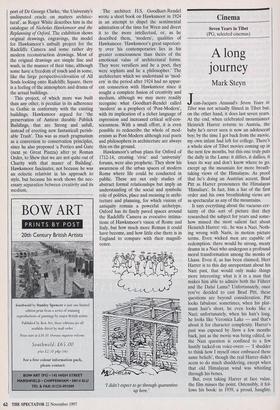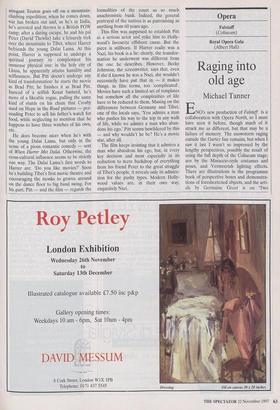Cinema
A long j ourney
Mark Steyn
Jean-Jacques Annaud's Seven Years in Tibet was not actually filmed in Tibet but, on the other hand, it does last seven years. At the end, when celebrated mountaineer Heinrich Harrer returns to Austria, the baby he's never seen is now an adolescent boy; by the time I got back from the movie, my own infant had left for college. There's a whole slew of Tibet movies coming up in the next few months, but this one truly puts the dally in the Lama: it dillies, it dallies, it loses its way and don't know where to go, except up the mountain for more breath- taking views of the Himalayas. As proof that he's doing an Austrian accent, Brad Pitt as Harrer pronounces the Himalayas `Himaliars'. In fact, him a liar of the first order and his own breathtaking views are as spectacular as any of the mountains.
It says everything about the vacuous cer- tainty of this sort of picture that they researched the subject for years and some- how missed the most salient fact about Heinrich Harrer: viz., he was a Nazi. Noth- ing wrong with Nazis, in motion picture terms. Even wicked men are capable of redemption: there would be strong, meaty drama in a Nazi who undergoes a profound moral transformation among the monks of Lhasa. Even if, as has been claimed, Herr Harrer is to this day unrepentant about his Nazi past, that would only make things more interesting: what is it in a man that makes him able to admire both the Fiihrer and the Dalai Lama? Unfortunately, once you've decided to cast Brad Pitt, these questions are beyond consideration. Pitt looks fabulous: sometimes, when his plat- inum hair's short, he even looks like a Nazi; unfortunately, when his hair's long, he looks like Veronica Lake — and that's about it for character complexity. Harrer's past was exposed by Stern a few months back, just as the movie was being edited, so the Nazi question is confined to a few hastily tacked-on voice-overs — 'I shudder to think how I myself once embraced these same beliefs', though the real Harrer didn't seem to do much shuddering, except when that old Himalayan wind was whistling through his bones.
But, even taking Harrer at face value, the film misses the point. Ostensibly, it fol- lows his book: in 1939, a proud, haughty, arrogant Teuton goes off on a mountain- climbing expedition; when he comes down, war has broken out and, as he's in India, he's arrested and thrown in a British POW camp; after a daring escape, he and his pal Peter (David Thewlis) take a leisurely trek over the mountains to Tibet, where Harrer befriends the young Dalai Lama. At this point, Harrer is supposed to undergo a spiritual journey to complement his immense physical one: in the holy city of Lhasa, he apparently attains humility and selflessness. But Pitt doesn't undergo any kind of transformation: he starts the movie as Brad Pitt; he finishes it as Brad Pitt. Instead of a selfish Kraut bastard, he's more of a likeable rogue, pulling the same kind of stunts on his chum that Crosby used on Hope in the Road pictures — per- suading Peter to sell his father's watch for food, while neglecting to mention that he happens to have three watches of his own, etc.
He does become nicer when he's with the young Dalai Lama, but only in the sense of a pious romantic comedy — sort of When Harrer Met Dalai. Otherwise, the cross-cultural influence seems to be strictly one way. The Dalai Lama's first words to Harrer are: 'Do you like movies?' Soon he's building Tibet's first movie theatre and encouraging the monks to groove around on the dance floor to big band swing. For his part, Pitt — and the film — regards the formalities of the court as so much anachronistic bunk. Indeed, the general portrayal of the natives is as patronising as anything from 60 years ago.
This film was supposed to establish Pitt as a serious actor and yoke him to Holly- wood's favourite offshore cause. But the piece is stillborn. If Harrer really was a Nazi, his book is a lie: clearly, the transfor- mation he underwent was different from the one he describes. However, Becky Johnston, the screenwriter, says that, even if she'd known he was a Nazi, she wouldn't necessarily have put that in — it makes things, in film terms, too 'complicated'. Movies have such a limited set of templates but somehow all the complexities of life have to be reduced to them. Musing on the differences between Germany and Tibet, one of the locals says, 'You admire a man who pushes his way to the top in any walk of life, while we admire a man who aban- dons his ego.' Pitt seems bewildered by this — and why wouldn't he be? He's a movie star, after all.
The film keeps insisting that it admires a man who abandons his ego, but, in every key decision and most especially in its reduction to mere backdrop of everything from his friend Peter to the great struggle of Tibet's people, it reveals only its admira- tion for the pushy types. Modem Holly- wood values are, in their own way, exquisitely Nazi.



















































































 Previous page
Previous page